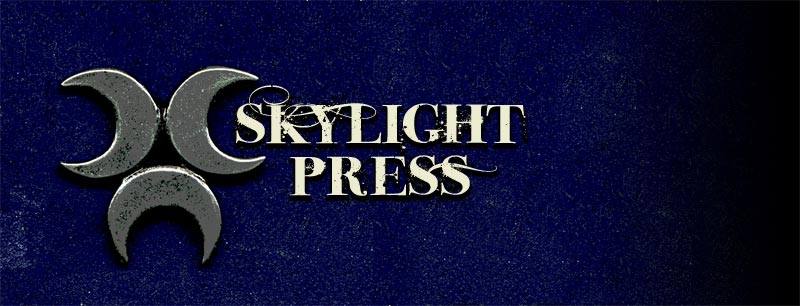 |
| POETRY / DRAMA | Our website has moved to a new host server. This is an old page which still works but is no longer being maintained. Please click here to visit our current site. |
|||||||||||||||||||
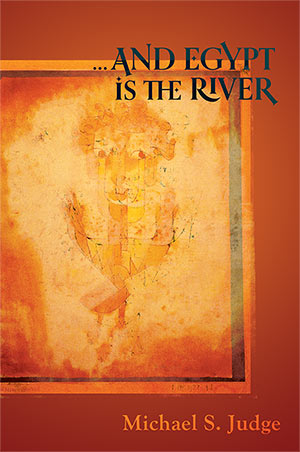 |
...AND EGYPT IS THE RIVER ...And Egypt Is the River is a collection of mystical prose-poems which the author describes as an attempt, based on the linguistic theories of R.W. Emerson, Ernest Fenollosa, and Hugh Kenner, among others, to trace the evolution of cosmology and myth as derived from a people's immediate sensory experience. In one sense it is an exploration of the genesis of language, the primal utterances that transcend from the physical world of sound denoting object to how images come to bring about self-awareness and fuse shared mythologies; or as the poet would say – “impact that compels words, that collect in fossil tidepools of the skull.” Explore the world of Hibou, the experiential, Klang, the experienced, and the 3rd, who oscillates somewhere in between. The reader will embark upon a brave and exploratory work in which he or she will have to embrace a new language, one that evolves as a physiological outgrowth of such a world. In good literary company, Michael S. Judge deftly manages to dispense with the cloying parameters of time and place and send the reader into a world of strange amalgamated scopes and scapes. Of his work he says coyly – “you could say it takes place in the pharaohs' Egypt, though it doesn't; or in Pisistratian Greece, though it doesn't; or for that matter in Missouri, say around 2666, which it might.” "If Egypt was a river, then it would eddy and flux, and sinuously expand like MSJ's hypnotic language. This is something rare and dangerous. Rich, sensuous and edgy, an unfurling scroll or a besotted map, powering Conrad up inside a post colonial Kubla Khan. Let it read you and be transformed." "Riffs of heightened prose pleasure the senses, with auditory, tactile, and hallucinatory provocations. To endure such a rigorous and sustained assault on the essential poetic metaphors is a fierce initiation. This Egypt of the Mental Traveller is a dream of the true path, subtle and dangerous and undeceived."
— Iain Sinclair
|
|||||||||||||||||||
ISBN: 978-1-908011-27-5 |
£9.99 |
$15.99 |
||||||||||||||||||
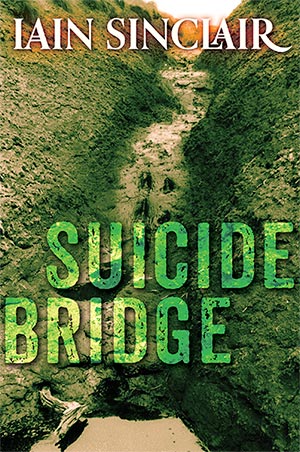 |
SUICIDE BRIDGE This classic text has in recent times been fused to its contemporaneous volume, Lud Heat, but very much deserves to stand on its own. Suicide Bridge was originally published by Albion Village Press in 1979 with the sub-title A Book of the Furies, A Mythology of the South & East – Autumn 1973 to Spring 1978. As elsewhere, Sinclair saunters into the shadowy city underworld with his ever-watchful eye and roving syntax, this time probing the mythic figures from William Blake's Jerusalem and the mythical king Bladud. Previously text-bound entities such as Hand, Hyle and Kotope are made flesh and and given to foggy breath in the contemporary landscape. Addressed to “the enemy” the reader is precariously perched on the teetering bridge while the author kicks at the mythic spindles that hold it up. Sinclair’s alternating, inter-penetrating prose and poetry become the uneven struts and pylons of a new concrete/abstract literary edifice. ‘One of the cliffs of Blake’s and Coleridge’s Albion sweeping against the walls of Everywhere… ‘Vitality is one of the many qualities radiating from Iain Sinclair’s superb collection, Suicide Bridge… Sinclair’s is a cerebral flame ignited by political anger… He is utterly traditional, his roots extending back through Ginsberg and Dorn, and beyond that, to Blake. His method is to appoint a cast of archetypes, Skofeld, Bladud, Coban, Atum, Kotope, and have them prance, like Sweeney, Ignu or Rintrah, through the wreckage of capitalism, manipulated by powerful rhythmic lines…’ ‘The book is an excitement to read. Always strong, always compelling, like a good thriller. How he can actually handle all the dark stuff, the mantic utterances, within his own being, I can’t say. He must have a strong psychic interface to deal with the Intruder who gives him these tales, who compels the knowledge, traces the dark patterns in the grass… Read it, for a totally other experience of hidden Albion.’ |
|||||||||||||||||||
ISBN: 978-1-908011-61-9 |
£11.99 |
$18.99 |
||||||||||||||||||
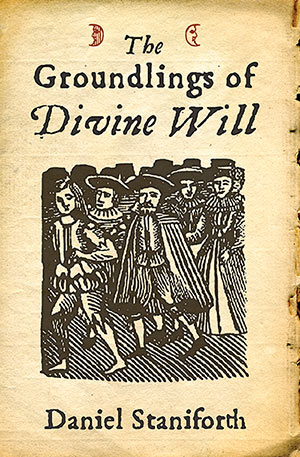 |
THE GROUNDLINGS OF DIVINE WILL From the author of Weaver in the Sluices and Diddle comes this controversial, self-reflexive, ironic and humorous response to the way that Shakespeare is so often taught in contemporary academia. The works of ‘Divine Will,’ as he is referred to throughout, have been confined to a vacuum, and almost biblically so in how the scripts have become wilfully detached from their moorings of time and place. In this hybridised long ‘Proem,’ Staniforth goes to absurd lengths of reattachment, gladly playing havoc with the swirling dictums and counter-dictums of his time, gleefully seeking to subvert the tautological authority of the neck-frilled academicians over the historical groundlings of the pit. Elements of satire, parody and burlesque are interposed as hagiographical substitutions made for the purposes of irony and deconstruction. The reader will be initiated into the amalgamated and timeless world of the Groundlings to see how their invective gospel simply illustrates how discourse, rhetoric and that grandiloquent power of oration serves as the strongest definition for our collective place in history. Staniforth is not afraid to dip into the cosmic trough and find magical pearls among the swine; the flashing twists and barbs of his heretic wit had me going up and down for hours. The tension between the divine will and human self-will is a subject that pervades the book; to that subject the profoundest insights into the hidden activity of providence and into human nature are brought. |
|||||||||||||||||||
ISBN: 978-1-908011-66-4 |
£8.99 |
$14.99 |
||||||||||||||||||
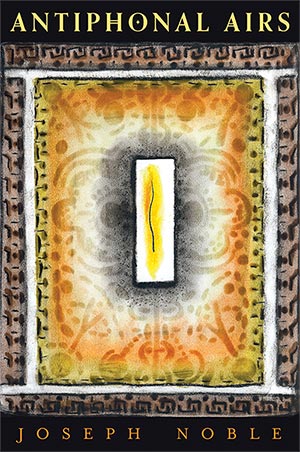 |
ANTIPHONAL AIRS Antiphonal Airs is a mixilating series of poems from poet-musician Joseph Noble. Some are improvisational riffs on specific composers, their lives and work, and some imitate the sonic movement and aleatoric rhythm of music itself. Noble works between polyphony and monody, his poetic lines mirroring the development of the seconda practica of the Baroque, in which the form of vocal music was made reflect and fit the meaning of the words. He follows the Orphic muse through music’s different phases and stylings, from the primal to the ornate, always following Hazrat Inayat Khan’s dictum that the world and its language come to us through sound and vibrations. Antiphonal Airs follows An Ives Set, which explored mercurial compositions of Charles Ives, and about which Andrew Joron wrote - "Noble has somehow tinkered a radio out of words, and tuned it to receive transmissions from a lost paradise of music. Yet Noble's line is listening, not to sound alone, but to pure pattern. Here, writing itself is graphically recast as a rhythmics of perception.” |
|||||||||||||||||||
ISBN: 978-1-908011-64-0 |
£9.99 |
$15.99 |
||||||||||||||||||
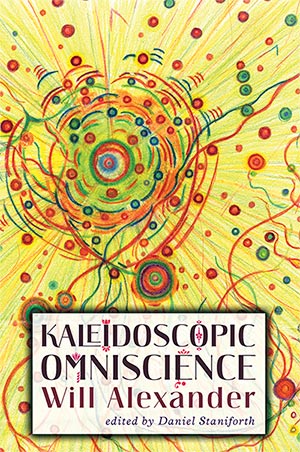 |
KALEIDOSCOPIC OMNISCIENCE Kaleidoscopic Omniscience is a new collection from lingual contortionist and poetic sage Will Alexander, featuring his early works – Asia & Haiti, The Stratospheric Canticles, and Impulse & Nothingness. Alexander’s prismatic and oracular voice cascades around bi-geographic confrontations, painterly morphologies, and the cosmology of the void. “No subject seems alien to him: Who else would write a poem on the death of Enver Hoxha? Who else would attempt to inhabit the brain of an animal in ecological catastrophe? Who else could spin a book-length poem from the verb ‘to paint’? – a poem that not only ranges through the history of world art, but which is an extended meditation on the way seeing is transformed by the chemical compounds of paint into vision.” "... multiplicity, simultaneity, collapsing of interior/exterior boundaries, restless migratory intelligence ... An uncancelled wavering and a "brimstone fire" of focus, unflinchingly alert to the vast sentient suffering, also to the astonishing resourcefulness and the yet unimagined forms of life on this planet at the edge of the Milky Way." "[Alexander is] acutely conscious of the issue of poetic voice, and is unwilling to let poetry's potential for ventriloquizing or exploring the voices of others be subsumed in an impersonal écriture or ultimately homogenous montage. He seems as well interested in the spiritual dimension of poetry, especially in the degrees to which poetry can give us access to spiritual or emotional states beyond those we normally experience."
– Mark Scroggins, American Book Review |
|||||||||||||||||||
ISBN: 978-1-908011-49-7 |
£13.99 |
$21.99 |
||||||||||||||||||
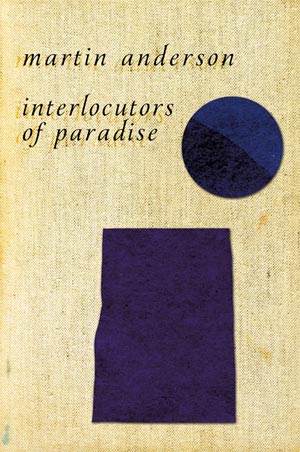 |
INTERLOCUTORS OF PARADISE Interlocutors of Paradise is a collection of five short meditations on colonialism and the Western mind by a British poet. Written as a series of provocative, symbolist-tinged prose-poems, each section situates the reader in beautifully crafted spaces, hollows to be filled either by spiritual purpose or wilful invasion. It begins by evoking the historical formation and expression of national identity - an identity predicated on past colonial and imperial activities. This is followed by three meditations that are largely situated within that region of the Thames estuary where Joseph Conrad lived, set and conceived Heart of Darkness. The Thames, that river in the book on which floated “The dreams of men, the seed of commonwealths, the germs of empire”, figures prominently also in the book’s opening meditation, where it is the setting of, amongst other things, Edmund Spenser’s poem Prothalamion and his friend Sir Walter Raleigh’s departure and voyage to Roanoke in the New World. In the final meditation its presence fades giving way, instead, to the aspirant spaces of a settled New World. But a world not ‘settled’ enough to have eradicated restlessness. Martin Anderson, author of various books of poetry, including The Ash Circle and Belonging, delivers another collection of poignant but elegantly powerful and sensitive poems. "Great purity and acuity, and a perfect ear. A wonderful poet." "Beautiful writing — treasure trove of emanations: orchards, hedgerows, meadows, coastlines, a land I used to know and still love in the nerves. A stilling for the nerves. The texture thick with an ancient country's history now learning to trace back, through all its exploitations, the sources of an elegy for lost empire. Has English poetry made the best out of that drawn-out loss?" |
|||||||||||||||||||
ISBN: 978-1-908011-56-5 |
£9.99 |
$15.99 |
||||||||||||||||||
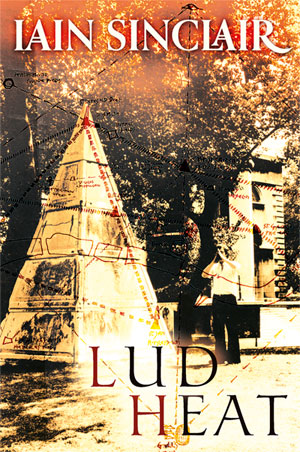 |
LUD HEAT Iain Sinclair’s classic early text, Lud Heat, explores mysterious cartographic connections between the six Hawksmoor churches in London. In a unique fusion of prose and poetry, Sinclair invokes the mythic realm of King Lud, who according to legend was one of the founders of London, as well as the notion of psychic ‘heat’ as an enigmatic energy contained in many of its places. The book’s many different voices, including the incantatory whispers of Blake and Pound, combine in an amalgamated shamanic sense that somehow works to transcend time. The transmogrifying intonations and rhythms slowly incorporate new signs, symbols and sigils into the poem that further work on the senses. This was the work that set the ‘psychogeographical’ tone for much of Sinclair’s mature work, as well as inspiring novels like Hawksmoor and Gloriana from his peers Peter Ackroyd and Michael Moorcock, and Alan Moore's From Hell. This new re-issue includes the illustrations and photographs from the original 1975 edition, which were absent from some later editions. "Lud Heat is ostensibly a narrative of a period of employment in the Parks Department of an East London borough; this temporal location, however, receives less stress than the spatial one with which it intersects: that of the pattern imposed on the townscape by Nicholas Hawksmoor's churches, potent presences in the poet's working environment, around which accretes a second temporal dimension, historical and mythological ... When Sinclair writes of the modern city that 'natural & ancient rhythms are perverted in Golgonooza's architecture' it is as part of a firmly patterned written structure that we have first of all to take his words. Only thus, sustained by powerful written ligatures, can the arrangement of the poet's information command any credence as argument." – Andrew Crozier |
|||||||||||||||||||
ISBN: 978-1-908011-60-2 |
£9.99 |
$15.99 |
||||||||||||||||||
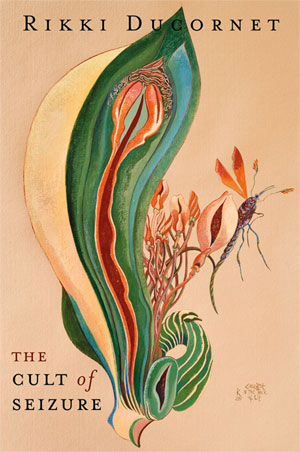 |
THE CULT OF SEIZURE “The lunatic algebra of Love. The frenzied orbits of Mood. The malarial temperatures of Wound, Symbols of the Cult of Seizure: This flesh, this amulet incised. This hot spoor of predators. This zodiac savaged in the sky.” The Cult of Seizure is a work of lyrical mesmerism and animal magnetism from acclaimed novelist and artist Rikki Ducornet, which displays a lush poesis and visionary soul. Jane Urquhart describes it as a “combination of the bestial and the bestiary; of terror and of tenderness.” Although an earlier work it contains all the evocative tapestries of her finest novels. "Sharp, haunting poetry from a fine practitioner of the art. If you read only one book of poetry this year ..." – Globe & Mail "...If you're willing to take the plunge into poetry that cuts close to the bone of our dreams and obsessions, The Cult of Seizure contains some absolutely stunning examples of how language can transform actuality. Using as her model the medieval bestiary, wherein natural and imaginary animals mingled in glorious confusion, Ducornet... has mixed the rivetingly graphic and the ferociously fanciful into a striking volume of verse." – Toronto Star "Rikki Ducornet is such a writer, mercifully and productively out of step with her time. She brings to her work a sense of curiosity that many contemporary writers have forgotten. Every object for her, as for Blake, has the potential to be an immense world of delight, opening perpetually up, with this delight being mirrored in the twists and turns of the language that both reveals and evokes it." – Brian Evenson |
|||||||||||||||||||
ISBN: 978-1-908011-46-6 |
£8.99 |
$14.99 |
||||||||||||||||||
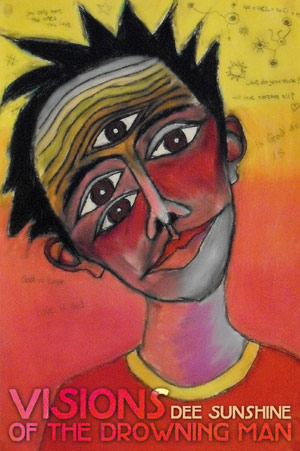 |
VISIONS OF THE DROWNING MAN Visions of the Drowning Man is the third book of poetry from Glaswegian poet, musician and visual artist, Dee Sunshine. This series of poems reads like the last chimerical oracles of a doomed soul, pawing at the final waves of some foisted ontology. Sunshine submerges the reader in loosely unravelling contrapuntal rhythms and the breathless language that swirls between anguish and release. But the journey down the Dantean whirlpool is not all despair; there is the topography of Blake’s archetypal grandeur to luxuriate in, as well as Baudelaire’s dolorous sensuality. It is the poetic language of asphyxiation. This edition includes 21 spectacular full-page ink drawings. “His work reminds me of Blake’s proverb about the road of excess leading to the palace of wisdom.” – D.M. Thomas “… Dee Sunshine is the poetic equivalent of Hieronymus Bosch (one look at Gardens of Earthly Delight and you will understand).” – Des Dillon |
|||||||||||||||||||
ISBN: 978-1-908011-42-8 |
£10.99 |
$17.99 |
||||||||||||||||||
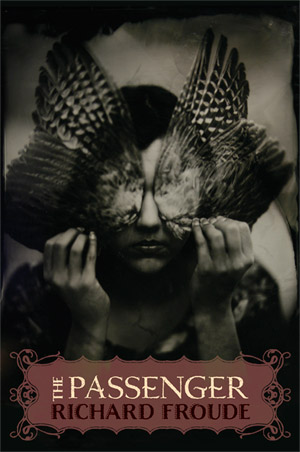 |
THE PASSENGER Native Bristolian now living in Colorado, Richard Froude is The Passenger, serving up a unique collection of writings that navigates both duelling states and hybrid forms. This poetic map charts the space between continents, where tectonic shifting plates transliterate a new amalgamated psychic zone between the root and newly adopted margins. Froude’s new/old world is peopled with dislocated figures in some absurd geo-spiritual collage. Following from his recently published Fabric, Froude continues to explore peculiar immigrant pathology on a journey that likely has no end. The Passenger is a two-part work, previously published as The Margaret Thatcher Trilogy (Catfish Press) and The History of Zero (Candle Aria Press). Of the former, Robb St. Lawrence wrote tellingly in Phoebe Literary Journal: “Froude’s management of repeating themes, fugue-like in their harmonization, is powerful and suggestive. He extracts the certainties of voice from the declaratives he deploys and ultimately turns that certainty against itself. Froude’s collection reads as the utterances of a speaker who dwells always in the midst of the words to which he is giving voice, head turning one way and then another, startled to catch them wavering as they float by, but utterly convinced of the seriousness of his operation.” "Richard Froude was grown from film stills. Above all he was a mirror. Much of his soil was gathered from conversation. Nothing is outside the screen. His house was built entirely of redirected rivers. This caused a book of between, a book of plywood and polymers, a book we are never finished reading." – Eric Baus "The wild mind and language keeps coming. Richard Froude always surprises and The Passenger is no exception. Characters with terrific allegorical names like Design and Zero romp in the skies. ("My limbs are cirrus clouds"). America is a linguistic map of fleeting yet marvellous accounting. "Here, existence as repetition," we note as we converse within the Q&As and trajectories of futuristic twists and boggle. Kudos to this rich, hilarious mental acumen." – Anne Waldman |
|||||||||||||||||||
ISBN: 978-1-908011-38-1 |
£9.99 |
$15.99 |
||||||||||||||||||
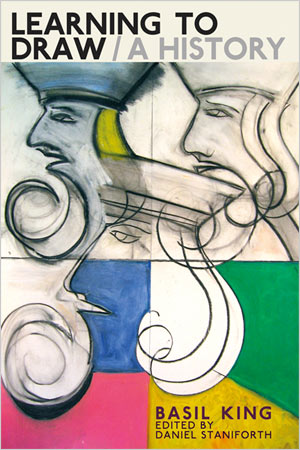 |
LEARNING TO DRAW / A HISTORY From London’s East End to Black Mountain College to the New York Art scene, Basil King can people a canvas like no other. Learning to Draw/ A History is an evolving and transformative narrative sketch, alternately prose and poetry, that that serves to document a personal and yet collective history with a roving Artist’s eye. Previously serialised in a number of small journals and zines, the work has met with some acclaim and Skylight Press is pleased to offer the first complete version in a new architectural alignment. Although from post-war Britain, King’s literary lineage harkens back to the projective verse style of Pound and Williams, sweetened through his working associations with the likes of Blackburn, Ginsberg and Baraka. The weaving of subjects in this work is not unlike the purposeful mixing of colours on an artist’s palette, which other notable poets have also been quick to praise: “The poems, rather than acting as an extended narrative (which is what I’d at first assumed they would do) interlace, so that the structure is like an evolving web. What is at stake here is a history, but history being a fluid thing, is never going to appear the same no matter how often the survivors tell their tales. With each new piece of information the whole is altered: not just by addition, but by complication.” – Laurie Duggan "It's a hair-raising page-turner and, at the same time, a sweet and reassuring journey through the working of a mind fully engaged by the mystery of the eye, the hand, and the measure of words... The second half of the 20th century was that marvellous time when the marriage of art and poetry was consummated by some of the greatest lovers. Learning to Draw is a story from that wedding." |
|||||||||||||||||||
ISBN: 978-1-908011-30-5 |
£13.99 |
$21.99 |
||||||||||||||||||
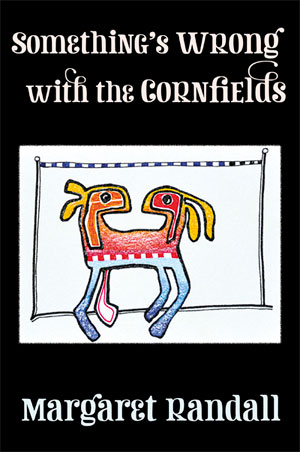 |
SOMETHING'S WRONG WITH THE CORNFIELDS “I think of these as my ‘impossible poems,’ poems made from the battered language they are leaving us with, the torn and devastated language, the words twisted to mean the opposite of what they have always meant… turning language back on itself, as if going home…" Margaret Randall’s Something’s Wrong with the Cornfields offers an array of sacred spaces, evocative landscapes, historical acts, and personal infusions. The poems augur around the ability to alternate between the universal and the obscure, between personal orbit and cultural aura. Some poems constrict like bloodward spirals…. and others unravel from their topical moorings. As with earlier volumes like Stones Witness, hers is a language in flux, where the willingness to yield alephs and symbols over time gives the poet a new scope to write beyond fixity. ‘Better than a memoir, Margaret Randall’s collection of unpublished poems, “Something’s Wrong with the Cornfields” celebrates the lives she has observed, of workers and oppressed peoples, as well as poets and intellectuals. The passion expressed in Meg Randall’s long career as a poet, editor, and activist comes tumbling out of this huge collection, brimming over the edges of every poem.’ – Diane Wakoski, author of The Diamond Dog |
|||||||||||||||||||
ISBN: 978-1-908011-10-7 |
£9.99 |
$15.99 |
||||||||||||||||||
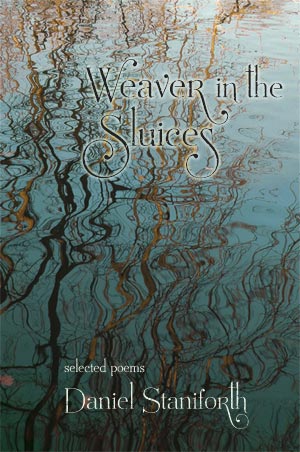 |
WEAVER IN THE SLUICES "Daniel Staniforth’s book of poems Weaver in the Sluices is an intermixing of zones where the light of the waking body rises and transmixes its power with falling uranian whispers. These poems exist at the cusp where both realities overspill and condense, making fleeting forays into the unsayable." — Will Alexander, author of The Sri Lankan Loxodrome and Above the Human Nerve Domain "In Weaver in the Sluices, Daniel Staniforth pulls variously from Bardic "Composer and musical producer as well as poet, what strikes me most profoundly about Staniforth's work is his training as a musical instrument luthier, a skill as sensitive as it is intuitive. For it is this sensitivity and intuition, this fine-tuning, that is most uniquely present in Weaver in the Sluices. These poems spring resonant from the page. It is especially in the imagery of the longer pieces that the poet's originality shines. A book to be savoured!" "There is a strong current of Englishness weaving through Daniel's work and a deep connection with natural magic and the soul of the land, but it is diverse enough to take in the bleak and the gritty as well as his finely crafted dreamworlds." |
|||||||||||||||||||
ISBN: 978-1-908011-08-4 |
£9.99 |
$15.99 |
||||||||||||||||||
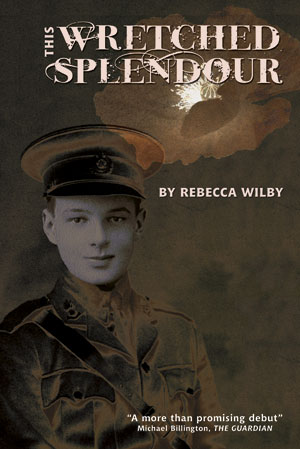 |
THIS WRETCHED SPLENDOUR A full-length stageplay in two acts Seven bored and demoralised survivors in a Flanders trench in 1916 find their lives transformed by the arrival of a new officer, David Cartwright. With his bright charisma and subversive approach to authority he inspires them to face their seemingly inevitable fate with courage, high-spirited stoicism and a sanguine sense of humour – the only defence against a bleak and mindless war. "The standard first world war play is still RC Sherriff's Journey's End. But Rebecca Wilby, a 29-year-old from Cheltenham, knocks it into a cocked hat with This Wretched Splendour. Where Sherriff's play is steeped in the public-school ethos, this one conveys the eccentric humanity and the tragedy of life at the front line." Time Out
|
|||||||||||||||||||
ISBN: 978-1-4461-5419-9 |
£8.25 |
$13.25 |
||||||||||||||||||
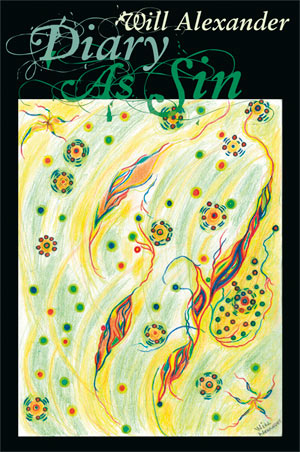 |
DIARY AS SIN “Celestial fire modulates through neon fields and aches throughout the lathe of space, animated into dynamic magnetism and psychedelic constellations. Vision explodes through planetary energy as dimensions shift invisibly. Will Alexander is a phenomenal and singular poet, a poet who allows me to leave the abyss of pedestrian sensation and enter a state of mind that thrills me with his animated breath…” Diary as Sin is the powerful and evocative story of a sand-blind girl, Rosanna Galvez. Confined to a private Catholic home in New Mexico, she unveils her beginnings as an incest baby – and moves through the odyssey beyond – with powerful incantatory language. Through poetic and often painful recall, Rosanna weaves a diary that will spellbind the reader with its imagistic and visionary prowess. Alexander cites Beckett, Bernhard and Goytisolo as an “ancestral trilology” for the work, living up to his forebears with some aplomb. Will Alexander is known to the literary world as the avant garde poet that continually defies easy classification. Though a Los Angeles native, his work more resembles Breton, Paz, Cesaire, or Gascoyne more than anything in contemporary US poetics. Even such comparisons are glib as Alexander is that rare voice that must be experienced in its own right. For Andrew Joron he is “the fiery trickster leaping between frozen and fragmented realia, the universal translator of the multitude of tongues (both human and inhuman) emitted by the Signal of signals.” For Harryette Mullen he is “a poet whose lexicon, a ‘glossary of vertigo,’ might be culled from the complete holdings of a reconstituted Alexandrian library endowed for the next millennium.” For Nathaniel Mackey his “thicketed prose advances lexical ignitions of astounding angle and amplitude.” |
|||||||||||||||||||
ISBN: 978-1-908011-13-8 |
£11.99 |
$17.99 |
||||||||||||||||||
| FORTHCOMING TITLES ... | ||||||||||||||||||||
|
||||||||||||||||||||
|
||||||||||||||||||||
COMING 2014 Breccia is an inspired grouping of poems from celebrated poet, translator, anthologist and essayist, Pierre Joris. After a limited initial publication by Station Hill/ Guernica, this wonderful collection will be finally be available once again. "[Breccia] is a showcase for poems from roughly twenty, sometimes rather fugitive, volumes, written and published during a time when Joris was living as a kind of postmodern nomad. One of the virtues of this in-gathering of work is that it makes clear the extent to which a sense of 'nomadism' — of being intensely in a place because one knows one has already left it — marks Joris' poetry.... The sense of immediacy in his work is striking. But the images of weather and shifting light and shade that give so many poems their climate of feeling, always play against a complex flow of conceptual activity and the possibility, but only the possibility, of archetypal permanence…” — Don Byrd “…This is honest, radical work, close to the beginning of a poetic disenchanted with its own airs and graces...Pierre Joris is a wonderful poet of remarkable breadth of concern and lyric occasion." — Robert Kelly “…The scope of the work is large, the thrust is synthesizing, the idiom particular and rich…” — Jerome Rothenberg
ISBN: 978-1-908011-88-6 |
||||||||||||||||||||
|
||||||||||||||||||||
|
|
|||||||||||||||||||